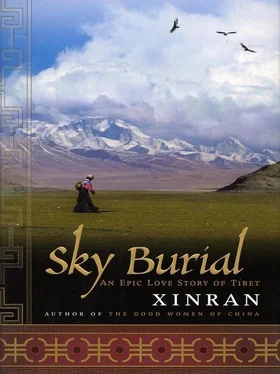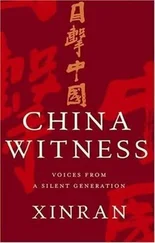“What do women know about enemies? Or hate?” shouted a voice from the crowd. “Just shoot the Tibetan.”
Wen spun around to face the voice. “Who says I don’t know about enemies? Or hate? Do you know why I left Suzhou and traveled thousands of miles to this terrifying place? I came looking for my husband. We’d only been married three weeks when he went to war in Tibet and now he’s disappeared. My life is nothing without him.” Wen burst into tears.
The soldiers fell silent. Wen’s weeping was accompanied only by the rustling and popping of burning wood. Dawn was beginning to break and a little extra light was illuminating the camp.
“I know what it is to hate. If my husband is really dead, dead at the age of twenty-nine, I’m here for revenge, to find his murderers. But don’t you think the people here hate us too? Haven’t you wondered why we haven’t seen any people here? Don’t you think that perhaps it has something to do with us?”
Wen looked around at her silenced audience, and continued more slowly and deliberately.
“All this death over the last few days is a warning to us. I’ve been thinking about it a lot: I’m just as afraid, as full of hate as you are. But why are we here? Have the Tibetans welcomed us? We’ve come to liberate them, but why do they hate us?”
“Company, fall in!”
The commander interrupted Wen. As the soldiers got into line, the commander whispered to her, “I understand what you’re saying, but you can’t talk to the soldiers like that. We are a revolutionary army, not a force for oppression. Get into line and await orders.” The commander turned to the soldiers. “Comrades, we’ve found ourselves in a very complex and serious situation. We must remember the army’s Three Great Regulations and Eight Principles, and the Party’s policy on minorities. We forgive the misunderstandings of the Tibetan people, strive for their cooperation and understanding, and work as hard as we can for the liberation of Tibet.”
The commander glanced over to Zhuoma and Wen.
“If we want to liberate Tibet, we need the help of the Tibetan people, especially Tibetans who can speak Chinese. They can lead us out of danger, win over the locals, and resolve misunderstandings. They can help us find water and places to camp, and teach us about the culture and customs of the Tibetans. The leadership has decided to take Zhuoma on as our guide and interpreter.”
Everyone was stunned by this unexpected announcement, none more so than Zhuoma. Confusion was written all over her face. She plainly found it difficult to understand the commander’s heavy Shanxi accent or what he meant by the army’s regulations and principles, but she realized that the soldiers had stopped looking at her with such fierce hatred. With no further explanation, the commander dispatched soldiers to bury their dead comrade, light the stoves for breakfast, put out the campfire, and check over the weapons store. Yet again the murdered man had been a driver, and so another truck had to be abandoned. The remaining trucks were now more crowded than ever. Before the convoy set off, the commander arranged for Zhuoma and Wen to sit together in the cab of the truck, where he usually sat. He said it was to allow the soldiers “a bit more room,” but Wen knew he wanted to give her and Zhuoma an opportunity to rest safely.
For the first part of the journey Zhuoma drifted into a long sleep, her head on Wen’s shoulder. When she woke up, Wen was pleased to see that life had begun to return to her eyes. Wen made her eat a little more flour paste, and as Zhuoma’s cheeks regained some color, she saw how young and beautiful she was.
“Where is your family?” asked Wen. “Where were you going?”
Zhuoma’s eyes were filled with sadness. As the truck jolted along, she quietly told Wen the story of her life.
ZHUOMA WAS twenty-one. Her father had been the head of an important, landowning family in the Bam Co region, a fertile area just north of Lhasa that was one of the gateways through the mountains, providing access to the north of Tibet. He presided over a large household with extensive lands and many serfs. Zhuoma’s mother had died giving birth to her, and her father’s other two wives had not produced children, so she had been her father’s greatest treasure.
When she was five years old, two Chinese men in military uniforms had come to stay in their household. Her father said that they had come to research Tibetan culture. It was only later that Zhuoma learned that they had been envoys sent by the Nationalist government in China to research the arts and customs of Tibet. The two Chinese had taken a great shine to her and, in their halting Tibetan, had told her many fascinating stories. The older of the two had preferred stories to do with Chinese history. He had told her about how five thousand years ago Da Yu had stopped the Yellow River from flooding by dividing it into two branches; how Wang Zhaojun, one of the Four Beauties of Chinese history, had brought peace to the north of China by marrying a barbarian king; how the principles of political power were contained in a book called The Three Kingdoms; and how Sun Yat-sen had founded the modern state of China. The younger man had entranced her with Chinese legends and stories of female daring. He talked of Nu Wa and how she had held a stone up to a hole in the sky when she saw it was broken, the Monkey King, who had challenged the authority of the heavens, and the young girl Mulan who had disguised herself as a man and joined the army in the place of her father, remaining undetected for many years.
Zhuoma had been enthralled by these tales, which were utterly different from anything in Tibetan culture. She pestered the two men endlessly, until they began to tell everyone that Zhuoma asked more questions than there were stars in the sky. With their encouragement, she learned to read Chinese characters, although she hadn’t wanted to write them herself, intimidated by the difficulty of copying the many pictures. The men had returned to China the year Zhuoma turned fifteen, taking with them many scrolls in Tibetan and leaving behind for her a huge pile of books, as well as a great loneliness and yearning for China.
As she was growing up, she would constantly beg her father to let her visit China, but he always said no, arguing that she was too young, or that it wasn’t a convenient time. But when she heard her father telling people that he was planning to emulate other landowners and send her to study in England because of the historic links between the two countries, she threatened never to marry if he did not let her see Beijing. Her father relented and allowed her to accompany an estate owner from a neighboring region on a trip to China. Since she could speak Chinese, this man had agreed to take her along, on the condition that she obey the sacred Tibetan law not to speak about what she knew and not to ask about what she didn’t know.
And so the young Zhuoma went to Beijing in springtime.
“The people and the traffic terrified me,” Zhuoma told Wen. “I’d thought of Beijing as another great grassland, like Tibet, with a different language and culture, of course, but no more than that. It was a huge shock. I couldn’t believe how much the Chinese talked. Their faces seemed so white and clean, completely unmarked by life. There were no horses, no grass, no space, only buildings, cars, people, streets, and lots of noise. And Shanghai shocked me even more. I saw creatures with golden hair and blue eyes-like the ghosts you see in Tibetan paintings-just walking along the streets. Our Chinese companion explained that they were ‘Westerners,’ but I didn’t know what he meant and couldn’t ask because I had to keep my promise not to ask about ‘what I didn’t know.’”
Читать дальше












